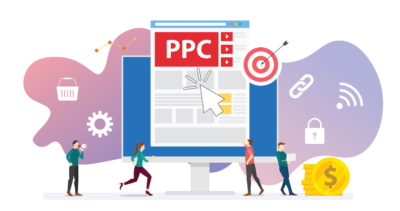PPC stands for pay-per-click, a model of net promoting within which advertisers pay a fee anytime one in every one of their ads is clicked. Primarily, it’s how of shopping for visits to your web site, instead of trying to “earn” those visits organically. Search engine advertising is one in every of the foremost standard types of PPC. It permits advertisers to bid for ad placement in an exceeding search engine’s sponsored links once somebody searches on a keyword that’s associated with their business giving. as an example, if we have a tendency to bid on the keyword “PPC software package,” our ad would possibly show up within the terribly high spot on the Google results page.
Every time our ad is clicked, sending a visitor to our website, we have to pay the search engine a small fee. When PPC is working correctly, the fee is trivial, because the visit is worth more than what you pay for it. In other words, if we pay $3 for a click, but the click results in a $300 sale, then we’ve made a hefty profit.
What is Google Ads?
Google Ads (formerly referred to as Google AdWords) is that the single hottest PPC advertising system within the world. The Ads platform permits businesses to make ads that seem on Google’s computer program and alternative Google properties.
Google Ads operates on a pay-per-click model, during which users bid on keywords and acquire every click on their advertisements. whenever a groundwork is initiated, Google digs into the pool of Ads advertisers and chooses a collection of winners to look within the valuable ad house on its search results page. The “winners” are chosen supported a mix of things, together with the standard and connexion of their keywords and ad campaigns, yet because of the size of their keyword bids.
More specifically, WHO gets to look on the page is predicated on an advertiser’s Ad Rank, a metric calculated by multiplying 2 key factors – CPC Bid (the highest quantity associate degree publiciser is willing to spend) and Quality Score (a worth that takes under consideration your click-through rate, relevance, and landing page quality). this method permits winning advertisers to achieve potential customers at a price that matches their budget. It’s primarily a sort of auction. The below infographic illustrates, however, this auction system work
Conducting PPC marketing through Google Ads is particularl valuable because, as the most popular search engine, Google gets massive amounts of traffic and therefore delivers the most impressions and clicks to your ads. How often your PPC ads appear depends on which keywords and match types you select. While a number of factors determine how successful your PPC advertising campaign will be, you can achieve a lot by focusing on:
- Keyword Relevance – Crafting relevant PPC keyword lists, tight keyword groups, and proper ad text.
- Landing Page Quality – Creating optimized landing pages with persuasive, relevant content and a clear call-to-action, tailored to specific search queries.
- Quality Score – Quality Score is Google’s rating of the quality and relevance of your keywords, landing pages, and PPC campaigns. Advertisers with better Quality Scores get more ad clicks at lower costs.
- Creative – Enticing ad copy is vital; and if you’re advertising on the display network, you can use a tool like our free Smart Ads Creator to create designer-quality ads that will demand clicks.
PPC Keyword Research
Keyword research for PPC can be incredibly time-consuming but it is also incredibly important. Your entire PPC campaign is built around keywords, and the most successful Google Ads advertisers continuously grow and refine their PPC keyword list. If you only do keyword research once, when you create your first campaign, you are probably missing out on hundreds of thousands of valuable, long-tail, low-cost and highly relevant keywords that could be driving traffic to your site.

An effective PPC keyword list should be:
- Relevant – Of course, you don’t want to be paying for Web traffic that has nothing to do with your business. You want to find targeted keywords that will lead to a higher PPC click-through rate, effective cost per click, and increased profits. That means the keywords you bid on should be closely related to the offerings you sell.
- Exhaustive – Your keyword research should include not only the most popular and frequently searched terms in your niche, but also to the long tail of search. Long-tail keywords are more specific and less common, but they add up to account for the majority of search-driven traffic. In addition, they are less competitive, and therefore less expensive.
- Expansive – PPC is iterative. You want to constantly refine and expand your campaigns, and create an environment in which your keyword list is constantly growing and adapting.
If you want to find high-volume, industry-specific keywords to use in your PPC campaigns, be sure to check out our popular keywords.
Managing Your PPC Campaigns
Once you’ve created your new campaigns, you’ll need to manage them regularly to make sure they continue to be effective. In fact, regular account activity is one of the best predictors of account success. You should be continuously analyzing the performance of your account and making the following adjustments to optimize your campaigns:
- Add PPC Keywords: Expand the reach of your PPC campaigns by adding keywords that are relevant to your business.
- Add Negative Keywords: Add non-converting terms as negative keywords to improve campaign relevancy and reduce wasted spend.
- Split Ad Groups: Improve click-through rate (CTR) and Quality Score by splitting up your ad groups into smaller, more relevant ad groups, which help you create more targeted ad text and landing pages.
- Review Costly PPC Keywords: Review expensive, under-performing keywords and shut them off if necessary.
- Refine Landing Pages: Modify the content and calls-to-action (CTAs) of your landing pages to align with individual search queries in order to boost conversion rates. Don’t send all your traffic to the same page.
You’ll learn more about all of these elements of PPC campaign management as you move forward through the coursework in PPC University.If you’re ready to get started with PPC, skip ahead to learn how to set up a Google Ads account.If you’ve already got an Ads account, we suggest you use our FREE AdWords Performance Grader to help you zero in on areas of improvement. In 60 seconds or less, you’ll receive a customized report grading your account performance in 9 key areas, including click-through rate, Quality Score and account activity.



